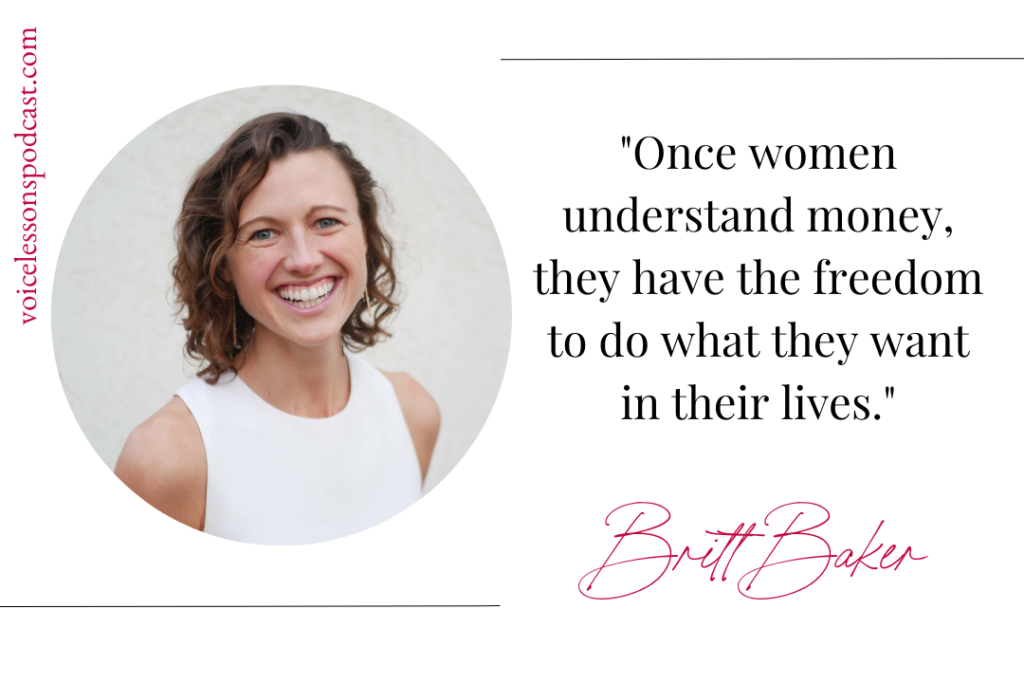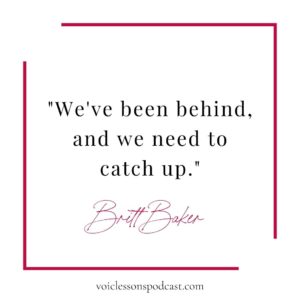A Lesson On How To Think Like An Investor with Britt Baker
Britt Baker and her company Dow Janes are on a mission to get 10,000 women invested by the year 2025. Why? Because good things happen when women have money.
Britt Baker and her company Dow Janes are on a mission to get 10,000 women invested by the year 2025. Why? Because good things happen when women have money. In this lesson on “how to think like an investor”, we speak to why it’s time for women to take control of their money so they can have more choices, louder voices, and more financial confidence when it comes to investing and building a foundation for their future.

Britt Baker is a Harvard Business School graduate with a penchant for personal finance and a knack for keeping things fun. Britt started investing at the age of 8 and has since been making saving and investing easy for anyone to understand.
LISTEN: APPLE PODCASTS | STITCHER | SPOTIFY
TOPICS DISCUSSED IN THIS EPISODE:
- How Britt got into investing at an early age.
- The concept of Dow Janes and the founder’s mission to help women invest.
- Dow Janes started as an investment club for women in Britt’s living room.
- The turning point when Britt and Laurie Anne teamed up to launch Dow Janes as co-founders.
- *Women donate their money more than men.
- The way that women invest.
- **About 39% of women have no retirement strategy, compared with 25% of men. Only 19% of women have a written retirement plan.
- Common misconceptions that women have about investing.
- How Britt defines confidence in investing.
- The subject of money is emotional and intangible.
- Your relationship to money drives how you relate to and use money.
- The 3 common themes that come up for women and money.
- Why Britt and Laurie Anne design what they are working on in their business based on their menstrual cycles
- Your cycles can be your superpowers if you use them correctly.
- Why women need to understand money in this moment.
- Why leading with intuition can be more powerful than the numbers.
- How women can have a conversation about taking on finances with their spouse.
RESOURCES/ADDITIONAL INFORMATION:
Dow Janes
Free “Think Like An Investor” webinar from Dow Janes.
The Million Dollar Year Program
**Giving while female: Women are more likely to donate to charities than men of equal means.
**Why women are less prepared for retirement than men.
In the Flo, Alisa Vitti
#LESSONUP:
(7:35-8:25) The stats are that women invest later and less often than men and that sets them back. I love that you call it your passive income account because that’s exactly what it is. And the sooner you get started, the more passive income you will have. And the fact that women tend to score lower on financial literacy tests. We just aren’t taught these things. Our parents teach their sons, but not their daughters. And so we’re, we’ve been behind and we need to catch up. And what’s great. What’s hopeful is that when women do get invested, they are better investors. They invest with their values. They invest in ways that support the environment and social causes. One of our missions is to get 10,000 women invested by 2025. And we know that when women are investing, it’s doing good for the world.
(9:18-9:46) We hear that all the time, people who say “I’m in my fifties and I haven’t saved anything for retirement, is it too late for me?” And what I would, what I always say to those people is, it’s never too late. You have to start somewhere. So you might as well start now. And one of the misconceptions that people have is that if they start in their fifties, they only have 10 years, but the truth is you don’t take all of your money out the day you retire, or the day you stop working, you actually have your entire life to leave that money invested. And so people starting in their fifties could have 30 or 40 years to invest their money.
(10:05- 10:47) Women make 90% of the household decisions, but often aren’t the ones who are making the investment decisions. They often don’t know where the money is or in what accounts or how it’s being used. So they make purchasing decisions, which is great. That’s where women have a lot of say. And earlier we were talking about how you vote and that’s, it’s great that women have the vote with the household dollar. But where there’s a gap is really understanding the rest of it. So where the money is invested and how it’s growing. I think a lot of women traditionally in household dynamics will give that piece to the men, to the husband, and then they’ll be in charge of the day-to-day groceries, et cetera. But the real potential is in where the money is invested and how that is growing.
(13:48-14:22) The gender wage gap is talked about a lot. I think there are ways to get around it as, as more and more women get into entrepreneurship and determine their own wages with their own businesses. That’s one way. That’s a bigger, bigger social construct that will hopefully change over time. But something that we do have control over that we don’t talk about as much is the investment gap and how women invest later and less often in life. And that we have total control over. Women could get invested with their first paycheck if they knew how and we’re ready to, and that’s where, with compound interest, that’s where the difference happens.
(16:08-17:28) One of the themes is fear that if I make more money, I won’t be accepted either by my family or my friends. So that’s one that we kind of has to shift out of. Another one that’s more common for women than it is for men. The way that socially we’ve been brought up is not to emphasize that it’s not to, what’s important as women like what’s emphasized is to get along right. Instead of to achieve traditionally. Another big challenge we have is that people associate money with evil. Like it’s not, it’s actually bad to have money and evil people have money. And so we try to shift that attitude by reminding them of the really powerful people who have money, who are doing good with that money, and to realize that your money, it gives you choice and freedom in the world, and it is how you vote. So you buy anything you buy with your dollars or how you use your money is how you’re voting in the world. And so the more money you have, the more choice and freedom you have, and the more influence you can have if you want to. I wish that weren’t how it was. I wish that people without money could have influence and the way the world is today. I’m hoping that it’s moving in that direction, but it’s not there yet.
(22:30-22:54) We use our intuition for making a lot of business decisions. We decide to work on things that we have just passion and drive for more than what the numbers say sometimes. And it has worked. And I think there’s a lot of different ways to run a business and you just have to find what works for you. And this works for us.
(23:41-24:21) Because once they understand money, they have the freedom to do what they want in their lives. So we talk with so many women who are living paycheck to paycheck or in loads of debt. And their only focus can be on how are they going to pay rent next month? Or how am I going to get out of debt? How am I going to even hit my minimum debt payment that I need to this month when really there’s so much potential and creative potential and life potential in everyone. And if money were not something that they had to worry about, they could instead just be focused on offering their gifts and sharing themselves with the world. It would be a better place.
Pin It:


Need to get the book
Yes!